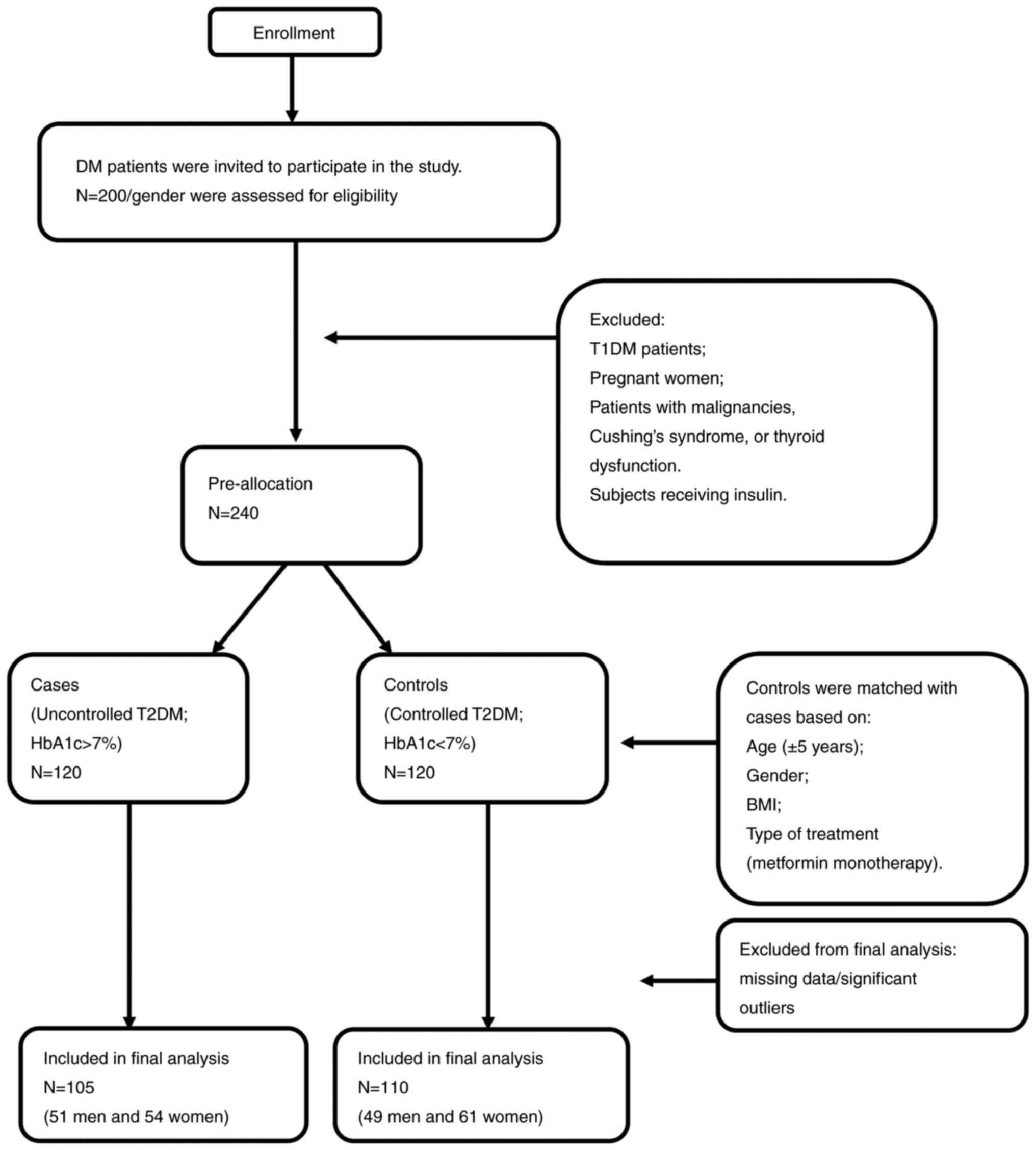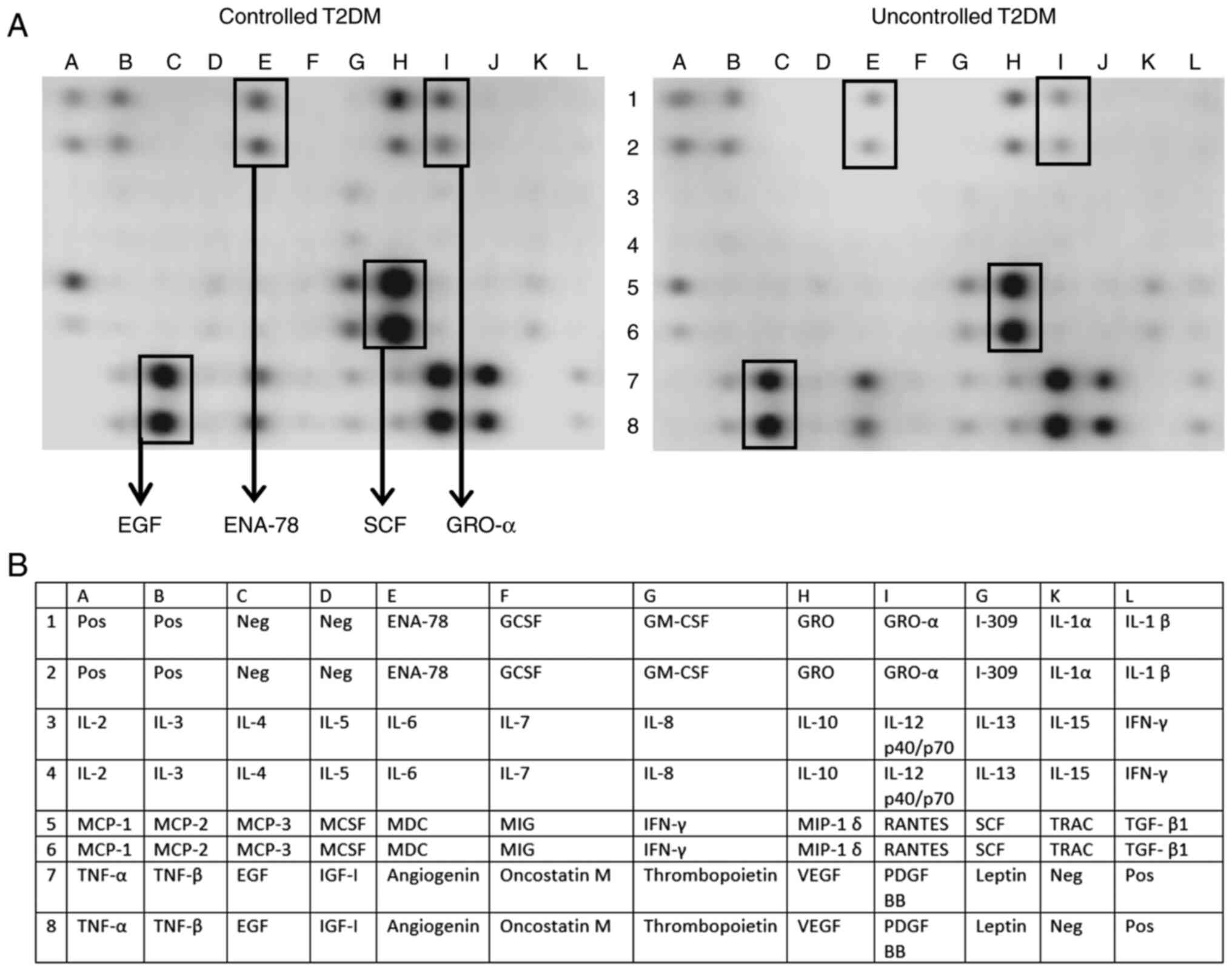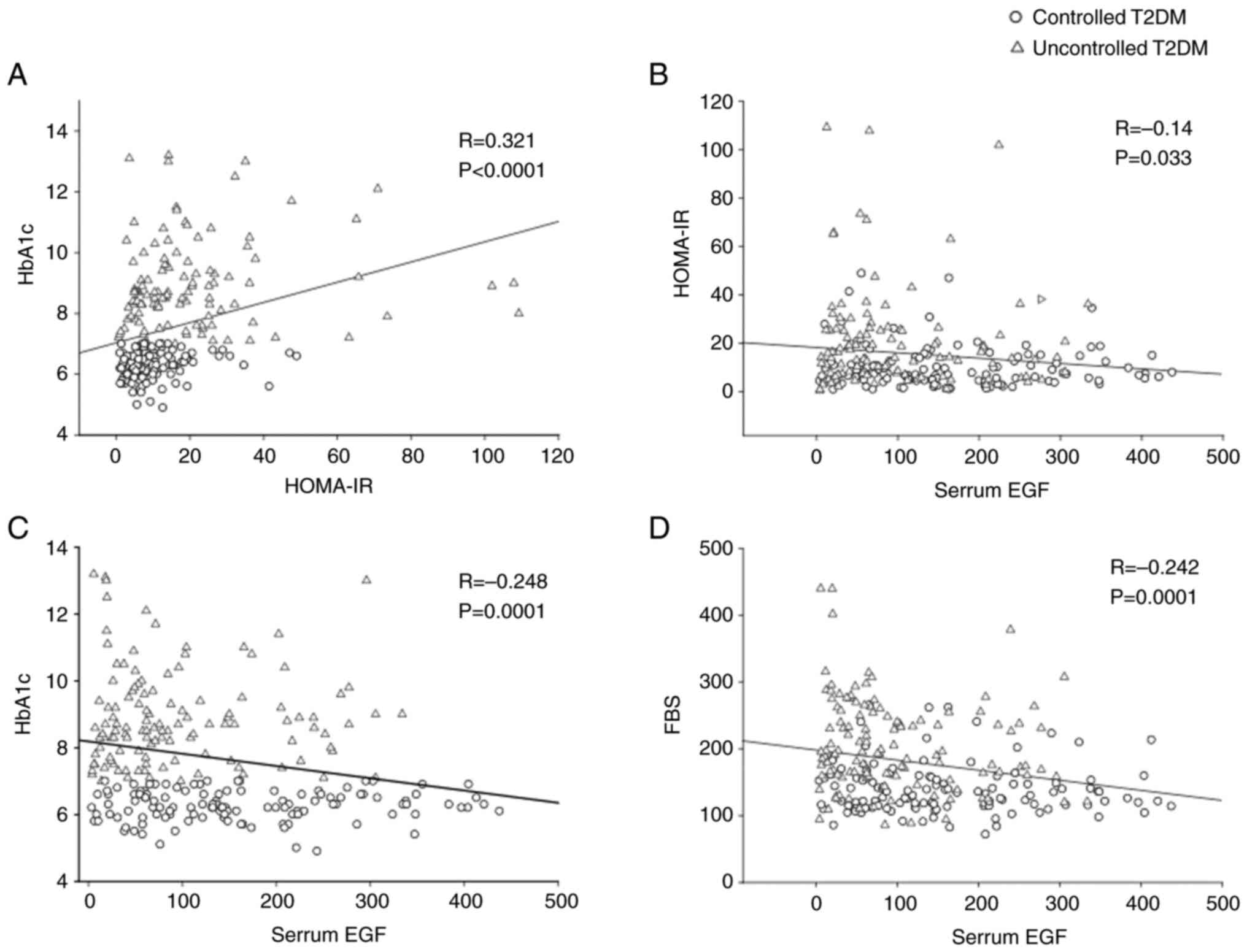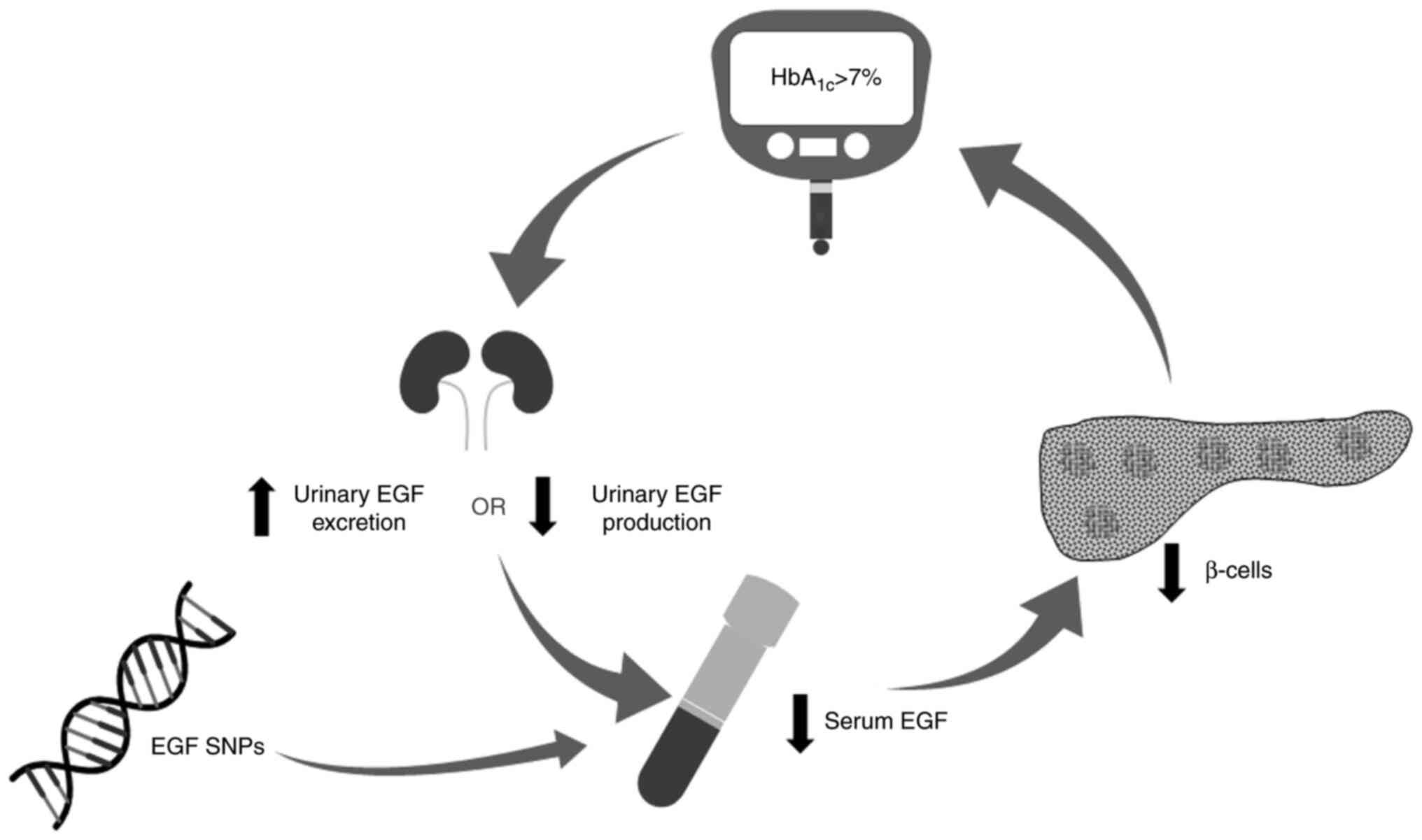|
1
|
International Diabetes Federation. IDF
Diabetes Atlas, 10th edition. Brussels, Belgium: 2021. Available
at: https://www.diabetesatlas.org.
|
|
2
|
Awad SF, Huangfu P, Dargham SR, Ajlouni K,
Batieha A, Khader YS, Critchley JA and Abu-Raddad LJ:
Characterizing the type 2 diabetes mellitus epidemic in Jordan up
to 2050. Sci Rep. 10(21001)2020.PubMed/NCBI View Article : Google Scholar
|
|
3
|
Kahn SE, Cooper ME and Del Prato S:
Pathophysiology and treatment of type 2 diabetes: Perspectives on
the past, present, and future. Lancet. 383:1068–1083.
2014.PubMed/NCBI View Article : Google Scholar
|
|
4
|
Tomic D, Shaw JE and Magliano DJ: The
burden and risks of emerging complications of diabetes mellitus.
Nat Rev Endocrinol. 18:525–539. 2022.PubMed/NCBI View Article : Google Scholar
|
|
5
|
Trikkalinou A, Papazafiropoulou AK and
Melidonis A: Type 2 diabetes and quality of life. World J Diabetes.
8:120–129. 2017.PubMed/NCBI View Article : Google Scholar
|
|
6
|
Aschner P: New IDF clinical practice
recommendations for managing type 2 diabetes in primary care.
Diabetes Res Clin Pract. 132:169–170. 2017.PubMed/NCBI View Article : Google Scholar
|
|
7
|
American Diabetes Association. 6. Glycemic
targets: Standards of medical care in diabetes-2020. Diabetes Care.
43 (Suppl 1):S66–S76. 2020.PubMed/NCBI View Article : Google Scholar
|
|
8
|
Fiagbe J, Bosoka S, Opong J, Takramah W,
Axame WK, Owusu R, Parbey PA, Adjuik M, Tarkang E and Kweku M:
Prevalence of controlled and uncontrolled diabetes mellitus and
associated factors of controlled diabetes among diabetic adults in
the hohoe municipality of Ghana. Diabetes Manag. 7:343–354.
2017.
|
|
9
|
Siddiqui FJ, Avan BI, Mahmud S, Nanan DJ,
Jabbar A and Assam PN: Uncontrolled diabetes mellitus: Prevalence
and risk factors among people with type 2 diabetes mellitus in an
Urban District of Karachi, Pakistan. Diabetes Res Clin Pract.
107:148–156. 2015.PubMed/NCBI View Article : Google Scholar
|
|
10
|
Cook MN, Girman CJ, Stein PP, Alexander CM
and Holman RR: Glycemic control continues to deteriorate after
sulfonylureas are added to metformin among patients with type 2
diabetes. Diabetes Care. 28:995–1000. 2005.PubMed/NCBI View Article : Google Scholar
|
|
11
|
Mirza S, Hossain M, Mathews C, Martinez P,
Pino P, Gay JL, Rentfro A, McCormick JB and Fisher-Hoch SP: Type
2-diabetes is associated with elevated levels of TNF-alpha, IL-6
and adiponectin and low levels of leptin in a population of Mexican
Americans: A cross-sectional study. Cytokine. 57:136–142.
2012.PubMed/NCBI View Article : Google Scholar
|
|
12
|
Rohm TV, Meier DT, Olefsky JM and Donath
MY: Inflammation in obesity, diabetes, and related disorders.
Immunity. 55:31–55. 2022.PubMed/NCBI View Article : Google Scholar
|
|
13
|
Lee HY, Yea K, Kim J, Lee BD, Chae YC, Kim
HS, Lee DW, Kim SH, Cho JH, Jin CJ, et al: Epidermal growth factor
increases insulin secretion and lowers blood glucose in diabetic
mice. J Cell Mol Med. 12:1593–1604. 2008.PubMed/NCBI View Article : Google Scholar
|
|
14
|
Song Z, Fusco J, Zimmerman R, Fischbach S,
Chen C, Ricks DM, Prasadan K, Shiota C, Xiao X and Gittes GK:
Epidermal growth factor receptor signaling regulates β cell
proliferation in adult mice. J Biol Chem. 291:22630–22637.
2016.PubMed/NCBI View Article : Google Scholar
|
|
15
|
Warzecha Z, Dembiński A, Konturek PC,
Ceranowicz P and Konturek SJ: Epidermal growth factor protects
against pancreatic damage in cerulein-induced pancreatitis.
Digestion. 60:314–323. 1999.PubMed/NCBI View Article : Google Scholar
|
|
16
|
Ledeganck KJ, den Brinker M, Peeters E,
Verschueren A, De Winter BY, France A, Dotremont H and Trouet D:
The next generation: Urinary epidermal growth factor is associated
with an early decline in kidney function in children and
adolescents with type 1 diabetes mellitus. Diabetes Res Clin Pract.
178(108945)2021.PubMed/NCBI View Article : Google Scholar
|
|
17
|
Sun H, Saeedi P, Karuranga S, Pinkepank M,
Ogurtsova K, Duncan BB, Stein C, Basit A, Chan JCN, Mbanya JC, et
al: IDF diabetes atlas: Global, regional and country-level diabetes
prevalence estimates for 2021 and projections for 2045. Diabetes
Res Clin Pract. 183(109119)2022.PubMed/NCBI View Article : Google Scholar
|
|
18
|
Zhang J, Lin C, Jin S, Wang H, Wang Y, Du
X, Hutchinson MR, Zhao H, Fang L and Wang X: The pharmacology and
therapeutic role of cannabidiol in diabetes. Exploration (Beijing).
3(20230047)2023.PubMed/NCBI View Article : Google Scholar
|
|
19
|
Forbes JM and Cooper ME: Mechanisms of
diabetic complications. Physiol Rev. 93:137–188. 2013.PubMed/NCBI View Article : Google Scholar
|
|
20
|
Cheng HT, Xu X, Lim PS and Hung KY:
Worldwide epidemiology of diabetes-related end-stage renal disease,
2000-2015. Diabetes Care. 44:89–97. 2021.PubMed/NCBI View Article : Google Scholar
|
|
21
|
Galindo RJ, Trujillo JM, Low Wang CC and
McCoy RG: Advances in the management of type 2 diabetes in adults.
BMJ Med. 2(e000372)2023.PubMed/NCBI View Article : Google Scholar
|
|
22
|
Sun YM, Qu W, Liao JB, Chen L, Cao YJ and
Li HL: Jiangtangjing ameliorates type 2 diabetes through effects on
the gut microbiota and cAMP/PKA pathway. Tradit Med Res.
7(7)2022.
|
|
23
|
Riedel AA, Heien H, Wogen J and
Plauschinat CA: Loss of glycemic control in patients with type 2
diabetes mellitus who were receiving initial metformin,
sulfonylurea, or thiazolidinedione monotherapy. Pharmacotherapy.
27:1102–1110. 2007.PubMed/NCBI View Article : Google Scholar
|
|
24
|
Boye KS, Lage MJ and Kiljański J: Time to
failure on oral glucose-lowering agents for patients with type 2
diabetes: A retrospective cohort study. Diabetes Ther.
12:1463–1474. 2021.PubMed/NCBI View Article : Google Scholar
|
|
25
|
Meybosch S, De Monie A, Anné C,
Bruyndonckx L, Jürgens A, De Winter BY, Trouet D and Ledeganck KJ:
Epidermal growth factor and its influencing variables in healthy
children and adults. PLoS One. 14(e0211212)2019.PubMed/NCBI View Article : Google Scholar
|
|
26
|
Isaka Y: Epidermal growth factor as a
prognostic biomarker in chronic kidney diseases. Ann Transl Med. 4
(Suppl 1)(S62)2016.PubMed/NCBI View Article : Google Scholar
|
|
27
|
Roskoski R Jr: The ErbB/HER family of
protein-tyrosine kinases and cancer. Pharmacol Res. 79:34–74.
2014.PubMed/NCBI View Article : Google Scholar
|
|
28
|
Jansen C, Lundquist I, Salehi A, Axelson J
and Ohlsson B: Does epidermal growth factor participate in the
regulation of glucose, insulin and glucagon levels? Eur Surg Res.
38:377–384. 2006.PubMed/NCBI View Article : Google Scholar
|
|
29
|
Baeyens L, De Breuck S, Lardon J, Mfopou
JK, Rooman I and Bouwens L: In vitro generation of
insulin-producing beta cells from adult exocrine pancreatic cells.
Diabetologia. 48:49–57. 2005.PubMed/NCBI View Article : Google Scholar
|
|
30
|
Wang H, Gambosova K, Cooper ZA, Holloway
MP, Kassai A, Izquierdo D, Cleveland K, Boney CM and Altura RA: EGF
regulates survivin stability through the Raf-1/ERK pathway in
insulin-secreting pancreatic β-cells. BMC Mol Biol.
11(66)2010.PubMed/NCBI View Article : Google Scholar
|
|
31
|
Kasayama S, Ohba Y and Oka T: Epidermal
growth factor deficiency associated with diabetes mellitus. Proc
Natl Acad Sci USA. 86:7644–7648. 1989.PubMed/NCBI View Article : Google Scholar
|
|
32
|
Armstrong DG, Boulton AJM and Bus SA:
Diabetic foot ulcers and their recurrence. N Engl J Med.
376:2367–2375. 2017.PubMed/NCBI View Article : Google Scholar
|
|
33
|
Wu X, He W, Mu X, Liu Y, Deng J, Liu Y and
Nie X: Macrophage polarization in diabetic wound healing. Burns
Trauma. 10(tkac051)2022.PubMed/NCBI View Article : Google Scholar
|
|
34
|
Araújo AP, Ribeiro R, Pereira D, Pinto D,
Sousa B, Catarino R and Medeiros R: Exp Biol Med. (Maywood).
234:241–245. 2009.
|
|
35
|
Cacina C, Arikan S, Düzköylü Y, Doğan MB,
Okay E, Turan S, Yaylim I and Isbir T: Analyses of EGF A61G gene
variation and serum EGF level on gastric cancer susceptibility and
clinicopathological parameters. Anticancer Res. 35:2709–2713.
2015.PubMed/NCBI
|
|
36
|
Trimal K, Shah T, Joshi K and Mulla G:
Association of EGF A61G polymorphism and EGF expression with type 2
diabetes mellitus in Indian population. Gene Rep.
15(100384)2019.
|
|
37
|
Ju W, Nair V, Smith S, Zhu L, Shedden K,
Song PXK, Mariani LH, Eichinger FH, Berthier CC, Randolph A, et al:
Tissue transcriptome-driven identification of epidermal growth
factor as a chronic kidney disease biomarker. Sci Transl Med.
7(316ra193)2015.PubMed/NCBI View Article : Google Scholar
|
|
38
|
Wong RW and Guillaud L: The role of
epidermal growth factor and its receptors in mammalian CNS.
Cytokine Growth Factor Rev. 15:147–156. 2004.PubMed/NCBI View Article : Google Scholar
|
|
39
|
Jung N, Kong T, Yu Y, Park H, Lee E, Yoo
S, Baek S, Lee S and Kang KS: Immunomodulatory effect of epidermal
growth factor secreted by human umbilical cord blood-derived
mesenchymal stem cells on atopic dermatitis. Int J Stem Cells.
15:311–323. 2022.PubMed/NCBI View Article : Google Scholar
|
|
40
|
Tang X, Liu H, Yang S, Li Z, Zhong J and
Fang R: Epidermal growth factor and intestinal barrier function.
Mediators Inflamm. 2016(1927348)2016.PubMed/NCBI View Article : Google Scholar
|
|
41
|
Kawaguchi M, Kamiya Y, Ito J, Fujii T,
Hayakawa F, Sakuma N and Fujinami T: Excretion of urinary epidermal
growth factor in non-insulin dependent diabetes mellitus. Life Sci.
52:1181–1186. 1993.PubMed/NCBI View Article : Google Scholar
|
|
42
|
Akhtar S and Benter IF: The role of
epidermal growth factor receptor in diabetes-induced cardiac
dysfunction. Bioimpacts. 3:5–9. 2013.PubMed/NCBI View Article : Google Scholar
|
|
43
|
Cortvrindt C, Speeckaert R, Delanghe JR
and Speeckaert MM: Urinary epidermal growth factor: A promising
‘next generation’ biomarker in kidney disease. Am J Nephrol.
53:372–387. 2022.PubMed/NCBI View Article : Google Scholar
|
|
44
|
Borai A, Livingstone C, Abdelaal F,
Bawazeer A, Keti V and Ferns G: The relationship between
glycosylated haemoglobin (HbA1c) and measures of insulin resistance
across a range of glucose tolerance. Scand J Clin Lab Invest.
71:168–172. 2011.PubMed/NCBI View Article : Google Scholar
|
|
45
|
Liu Y, Yu Q, Luo X, Ye L, Yang L and Cui
Y: A microtube-based wearable closed-loop minisystem for diabetes
management. Research (Wash D C). 2022(9870637)2022.PubMed/NCBI View Article : Google Scholar
|
|
46
|
Liu Y, Wang H, Wang Y and Xue LX: Annual
advances of integrative pharmacology in 2021. Tradit Med Re.
7(57)2022.
|
|
47
|
Fu LH, Qi C, Sun T, Huang K, Lin J and
Huang P: Glucose oxidase-instructed biomineralization of
calcium-based biomaterials for biomedical applications. Exploration
(Beijing). 3(20210110)2023.PubMed/NCBI View Article : Google Scholar
|
|
48
|
Kristófi R and Eriksson JW: Metformin as
an anti-inflammatory agent: A short review. J Endocrinol.
251:R11–R22. 2021.PubMed/NCBI View Article : Google Scholar
|


















